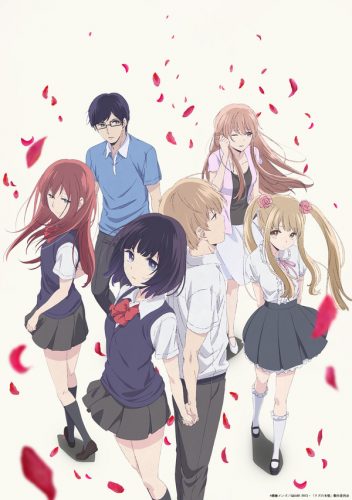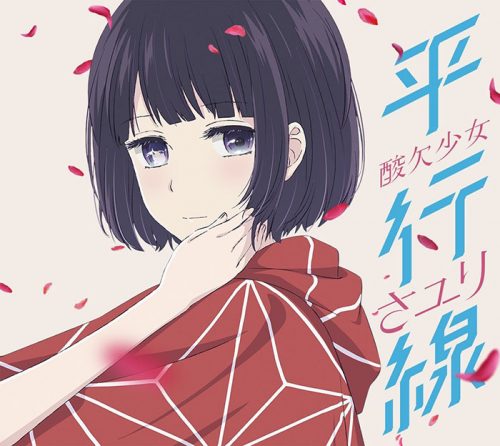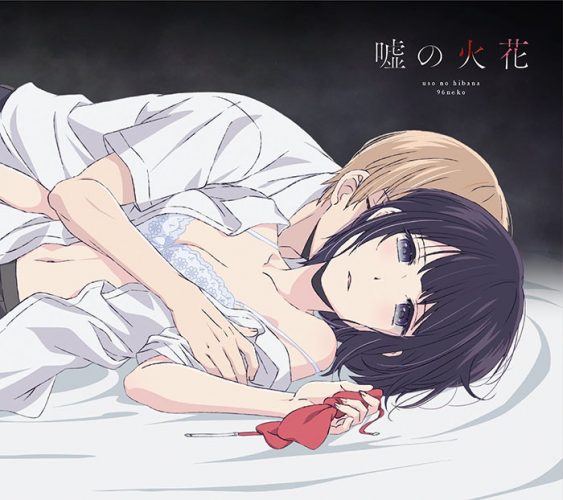- Episodes : 12
- Genre : Drama, Romance, School, Seinen
- Airing Date : Jan 2017 - Mar 2017
- Studios : Lerche
Contains Spoilers
Kuzu no Honkai Introduction and Story (Spoilers)
Hanabi Yasuraoka and Mugi Awaya are a couple, united in the fact that each of them loves a teacher. Through their shared unobtainable love, they fall together as a method of consoling themselves. To help chip away at the pain of unrequited love, they form a pact to provide physical comfort for each other. Initially, this plan seems to work out. The students around the school see them as an attractive couple and a natural fit. A few of their admirers, however, notice the cracks in their facade.
Noriko Kamomebata (who goes by Moka, an amalgamation of most cutest), is Mugi’s childhood friend. Filling out the childhood friend trope, Moka is always watching Mugi from afar. As a constant observer, she notices that Mugi and Hanabi’s relationship isn’t quite right. As the show develops, Moka is persistent in questioning their relationship as it unravels. Eventually her persistence pays off and she has a date with Mugi. Although her date yields the same platonic status she and Mugi had pre-date, it allowed Moka to finally move on.
Another secret admirer is Sanae Ebato, who Hanabi calls “Ecchan”. In a similar fashion to Moka, Ecchan questions the authenticity of Hanabi’s feelings for Mugi. Ecchan argues that Hanabi doesn’t act the way that a person in love should. When Ecchan finally gleams the truth, she asks to visit Hanabi’s house for a sleepover. This marks the beginning of a complicated partnership where Ecchan and Hanabi engage one another physically, each for selfish reasons. This relationship eventually resolves with Ecchan telling Hanabi that her heart is breaking. It’s not until Hanabi’s own growth later that she can approach Ecchan as a stronger person, and make amends for her callousness.
We’re thrown a curveball when Akane Minagawa’s (Mugi’s Crush) nature is exposed to the audience. Akane only feels pleasure when she knows men desire her. When she learns that Hanabi is in love with co-teacher Narumi Kanai, she begins manipulating him into courting her. After Akane and Narumi start dating, she’s bewildered by his lack of sexual advances. Perhaps as recourse, or just to keep him from leaving, Akane begins sleeping with Mugi. Although Narumi learns that Akane is sleeping with other people, he continues to pursue her. His eventual marriage proposal surprises Akane, but she’s even more shocked when she accepts his proposal.
Understanding the reasoning behind Narumi’s proposal is difficult. We receive little background story for Narumi, and his character is only fleshed out enough for us to learn he’s a nice guy. As Hanabi’s childhood friend, he has been there with her through hard times. After Hanabi confesses her feelings to Narumi, he holds her while she cries. It may never be clear why Narumi chose Akane of all people, but he knew her true nature and accepted it.
The initial relationship between Mugi and Hanabi is fuzzy, but as the show progresses they grow further and further apart. After not speaking for a few weeks, Mugi and Hanabi meet up and vow to admit their love to their respective crushes, and meet up after they get rejected. Mugi’s confession ends with him sleeping with his teacher, which dissolves his vow to Hanabi. The two never rekindle a relationship after that, and Mugi ends the show aimlessly moving forward, not much farther than where he started.
After the broken vow, Hanabi is left unsure of what to do. Having no connection with Narumi, Mugi, or Ecchan, she begins casting about in the dark. Because Hanabi feels weak when she is alone, she attempts Akane’s method of human connection. After trying to gather a collection of suitors who can validate her worth for her, Hanabi realized she was only bringing pain to herself and others. In school one day, Hanabi runs into Moka, who isn't the same person she used to be. Moka has learned to live for herself, and tells Hanabi to do the same. Hanabi takes Moka’s words to heart and stops seeking out comfort in relationships, instead hoping to become her own source of comfort.
The story in Kuzu no Honkai can be summed up by the idiom “any port in a storm”. The tangled web of romance presented in Scum’s Wish constantly breaks and reforms, vacillating between a love triangle, and hexagon. Complicated emotional dynamics are often portrayed in Anime, but the standard operating procedure is to mask reality with a fun presentation, uncomplicated and harmless. Kuzu no Honkai isn’t interested in conciliating its viewers. The show presents an unhealthy version of love that can be difficult to understand at times. More than any other show this season, Scum’s Wish asks you to step outside yourself and understand the characters from their own perspectives.
What I Liked About Kuzu no Honkai
Peeling back the layers of Kuzu no Honkai reveals a show about self-inflicted pain. The show takes an honest and earnest look at romantic paradigms like “the one who got away”. Many anime authenticate the idea that love and marriage make happiness, but Kuzu no Honkai suggests there is another way. Watching the characters grow as they throw themselves into the traffic of love is inspiring. Scum’s Wish encourages introspection, and suggests that you should never settle for unhappiness. Rather than becoming paralyzed by fear, the show suggests that we should never stop moving.
Kuzu no Honkai feels real in a way that very few anime can pull off. It’s worth noting that real and realistic have to be separated here; it’s hard to believe one small circle of people would suffer so many strange and atypical heartaches. The unusual relationships on display here are another reason for the success of this show. The subject matter of Kuzu no Honkai shows a Japan moving into the 21st century. The characters are refreshingly open with their intentions, and although they all end up hurt in one way or another, it’s not for lack of advances.
The strong character growth in Kuzu no Honkai is something we don’t experience too often in anime. The cast is unable to escape the crushing black hole of love, but they use their experiences to mature. If you look for it, you’ll find bits and pieces of yourself inside the actions of these people (though if you’ve ever experienced the full breadth of drama on display here, you’re probably still too busy sobbing in a mental institution to watch anime). Like putting aloe vera on a bad sunburn, the crux of this show is causing you pain and then offering relief. With that goal in mind, Scum’s Wish has absolutely succeeded.
Discussion Time ?
Different anime seek to validate themselves in different ways. Some shows offer you non-stop action, some bring a laugh a minute, some have (insert cliché #3 here). Scum’s Wish is a romantic drama, and so it lives and dies on feelings. Feelings arc across every interaction in Kuzu no Honkai, but many shows pack their scenes with emotion. In reality, not every feeling works in every situation. In anime, when characters have unsuitable emotions it’s just a run-of-the-mill day. But do you know what sort of thing never receives accolades? A run-of-the-mill thing. So let’s talk about the emotions in Scum’s Wish. Do they make sense? Are they authentic? Is this show worth your time?

1. The character study
Television shows tend to center around people...unless they’re nature documentaries. With a core team of people at the center, the show then decides whether it wants to follow them into battle, or live their ridiculous lives. At first glance, you would assume Kuzu no Honkai wants you to watch a romance blossom. In the beginning of the show you are blessed with scenes of Mugi and Hanabi on the rooftop together. Mugi and Hanabi in a bedroom together. Mugi and Hanabi holding hands. As the boxes get checked, you accept the type of story you’re about to absorb. As Mugi and Hanabi drift apart though, the show begins placing them in a multitude of “what if...” scenario’s.
Although romance is the theme of Scum’s Wish, there isn’t a central romance to the show. Kuzu no Honkai spends the course of it’s runtime delineating characters’ reactions. Ecchan confesses her love to Hanabi, we wonder how Hanabi will act. When Ecchan forces herself onto Hanabi during the sleepover, we wonder what Hanabi will do. When one of Akane’s old boyfriends calls her a slut in front of Kanai sensei, we wonder how he will react? How will she? Every character in the show has their own personality; Mugi is apathetic, Hanabi is curious and afraid. The adults aren’t setting a great example either, as Akane is vengeful and jealous, and Kanai is a pushover. Meanwhile, the side characters also have well detailed personalities - while Moka is childishly attached, Ecchan is aggressive and stubborn. All the characters, and how they respond to one another, form a deep pool of voyeuristic wealth.
2. The counter-culture examination of romance
While this holds true for western viewers, Scum’s Wish gains extra impact when you consider the anime landscape. Most romantic anime focus on two characters who can’t express their feelings. Their awkward interactions are almost never conductive to their goals, and if we’re lucky they’ll kiss by the end of the series. Standing far away from those shows, and looking on with disgust, is Scum’s Wish, which isn’t afraid of approaching difficult subject matter in earnest.
Some uncommon themes we get here are: friends with benefits, lesbian romance, cuckolding, casual sex, and age-gaps. None of these concepts are approached with humor, levity, or judgment. Other more common romantic themes are also present. Incest (Atsuya, Ecchan’s cousin, loves Ecchan and tries his hardest to initiate a relationship with her) is here, but that's strangely accepted in anime. You also get some classics like unrequited romance, and puppy love, but that all takes a backseat to the examination of what it means to love in the 21st century.
3. The Music

It might seem strange to mention music as a selling point, but I’m not talking about the OP and ED. The music in this show was composed by Masaru Yokoyama, who composed the scores for shows like Arakawa Under the Bridge, and Kimikiss Pure Rouge. You might say “so what?”, until you hear he also did the music for Shigatsu Wa Kimi no Uso (Your Lie in April). The music in Kuzu no Honkai is affecting and unusual for anime. With synths that feel like they came straight out of Twin Peaks, the scenes in this show are filled with musical cues that highlight the emotional turmoil of the characters.
1. The constant misery
Yes, many romances have drama. Do you know what they also have? Happy moments. Usually, when a show brings you down, they offset that by bringing you up again. In Scum’s Wish, you’ll rarely celebrate - usually one bad circumstance is traded laterally for another. When Mugi finally gets the courage to tell Akane that he loves her, she accepts his love which might seem great. She then immediately sleeps with him and it’s clear that like a parent trying to buy a child’s love, Akane is sleeping with Mugi to keep him in her stable of suitors. This theme repeats itself over and over, and the show never lets the characters (or the audience) feel good about small victories.
2. The unsatisfying plot developments
This does go hand in hand with the show’s unflappable sorrow, but every achievement feels underlined by pointlessness. Every viewer is different, but the “happy ending” seems to be Hanabi and Mugi as a couple. Since that would satisfy the audience, instead, Hanabi realizes her feelings after Mugi is long gone. Because Atsuya is a nice guy who is also caring and persistent, he never gets what he wants. Because we as an audience want to see Akane suffer, she gets the happy ending. This show takes pleasure in withholding, making anyone who sticks with the show a little bit like Kanai sensei.
3. The unlovable characters
The history of fiction is filled with bad guys that you hate to love. Here, there's no reason to love the bad guy. The problem is, there’s no reason to love the good guys either. Why? There are no good guys. Cases can be made, though, for Atsuya and Moka, whose good natures are rewarded with nothing. To be clear, I’m not saying that the characters are bad people either, they are just human. We all want to be seen as the best version of ourselves, and we want to see other people as the best version of themselves.
The characters in Scum’s Wish aren’t at their best, they’re in a transition period. All the characters enter the show with a mission statement, and quickly learn why their goals were unrealistic. What we’re watching in this show isn’t an achievement, but a pivot from childhood to adulthood. As the characters continue to make decisions that hurt other people, it gets hard to empathize with the seemingly oblivious cast.
Final Thoughts
We’ve all been presented with a very polarizing experience here. You’re never forced to decide between good and evil, instead you are tasked with being understanding. If you can commiserate with the characters of Kuzu no Honkai, you’ll find great enjoyment in this show’s questioning nature. As the characters make progressively less healthy choices, it will get difficult to feel good about enjoying it. By the ending of Scum’s Wish you’ll be faced with a big question: was my time with these people well spent?
Recommended Post
Kuzu no Honkai - Winter 2017
Recommended Post
[Thirsty Thursday] 6 Anime Like Kuzu no Honkai [Recommendations]
Recommended Post

